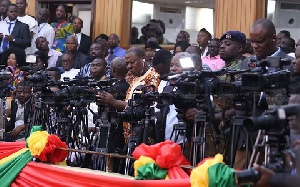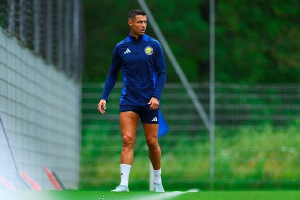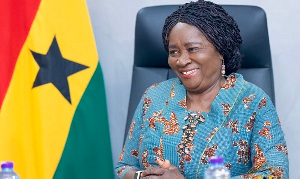Nyaba,
Labour day is here. And as usual every worker is talking about better conditions of service. And it is journalists who are reporting on these. The only problem is that journalists - including the very loud ones, suddenly develop speech and writing disorders when it comes to the issue of their own welfare, working conditions and salaries.
Nyaba, Since journalists themselves have proven to be people without testicular fortitude when it comes to discussions concerning their own welfare, I believe that the time has come for society to speak for journalists.
Let me explain. You see, the importance of good wages for journalists should be clear: unless the media industry is able to retain skilled, experienced journalists within its ranks the quality of reporting won’t improve. When we look at the future of the media in Ghana, we need to pay equal attention to both the space given to media voices, and the quality of the voices we hear. Analyzing the employment conditions of Ghanaian journalists plays a crucial role in tackling this second issue.
Nyaba,
I am currently in the process of writing a book that focuses on "why journalism doesn't pay". And the painful truth I have come across from speaking to many journalists from across the length and breath of the country is that Ghanaian journalists are poorly paid. Forget the hype on radio and TV. Many journalists' take home pay doesn't take them beyond the trotro station. To get "home" , many of of them top up their salaries through the collection of "soli".
I remember how as a young journalist with GBC, during one of my very first assignments when the phenomenon of "soli" was very new to me, I heard a very senior newspaper proclaim at the end of the assignment "this story will not see much ink". It was only 2 years ago that I came to understand the real meaning of those words.
Journalists who had been assigned to report on the event were not shown any "solidarity" by the organizers, and that informed my senior colleague's comments about the story seeing "little ink".
Sometimes, after events, journalists virtually trade their dignity for "soli". Those who work for TV channels will take 5 millenia and 20 centuries to disconnect their equipment, while radio and newspaper reporters will continue to conduct needless interviews until they catch the attention of the officer in charge of "soli".
In my study of 100 journalists from seven of the highest-ranked privately-owned radio and TV, newspaper as well as online media outlets (in terms of readers/listeners and revenue earners), 47 percent earn less than GHC 1,200 monthly. One third of the respondents earn between GHC 500 and GHC1000 monthly. By comparison, an Accra trotro driver, who has a good vehicle and commutes between Circle and Mallam Junction earns a higher net salary for an average month than 47% of Ghanaian journalists.
Of the 47 percent, many told me that they get their salaries later than promised due to the media employer’s financial restraints. In Tamale for example, some journalists are not paid for seberal months and eventually when the employer decides to pay them, if he owes them 5 months salary arrears, he may chose to pay them for only 3 months.
In Accra and Kumasi, once journalists receive their meagre salaries, a large percentage of this money goes into paying rent. It is no secret that rent in Accra is more expensive than many cities in the whole of Africa. According to a World Bank report in 2012, a two to three bedroom house lacking adequate sanitation facilities in Accra can cost anywhere from GHC300 to GHC1000 a month.
Another observation I made while gathering information for my yet to be published book is that media owners have difficulty in holding on to talented journalists under the current salary structure. What’s needed is a new way of thinking, one that will enable media managers to attract more revenue at a time when the global industry has buckled under economic pressures.
When I casually asked some of my friends who are media managers to tell me their top four media revenue sectors, they placed local telecommunications companies at the top of their list, followed by the Ghana government, beverage companies, and banking, insurance and financial services companies and alcoholic beverage manufacturers.
Having named the same companies, what it means is that the bargaining power has shifted from the media houses to the businesses. There are more than 40 radio stations in Accra alone. So if media house A will not take the amount proposed by business A, then Media house B will be more than willing to accept.
Furthermore, in the era of mergers, what it mean is that media houses will continue to lose revenue. For example, Tigo used to advertise on radio and TV and so did Airtel. As a result, media houses were raking in revenue from these two sources. However, with the merger of the two companies, the advertising revenue has now reduced to just one instead of two. Similar examples can seen from other mergers like Amal Bank and Bank of Africa, Fidelity Bank and Procredit, etc.
With the advent of social media, many businesses have now resorted to advertising on their own social media platforms. Ouch!
A media manager in Kumasi who I shall name in my book, says his biggest problem as manager of a radio station is ‘only financial'. "I need to hire skilled journalists, give them a good salary, buy equipment and you need a return on investment. Unfortunately, we haven't been able to pay our journalists well because the revenue is just not coming".
In short, the truth is that media organizations are simply not generating enough revenues to pay their journalists well.
But why do journalists work for no pay? Why do journalists highlight the suffering of others but neglect to talk about their own sufferings?
Why do journalists, look on while quacks - people who have neither been trained nor report for any recognized or registered organizations - continue to put them to shame?
Nyaba, I have a lot more questions, but we are by the roadside, so you...... Later.
Opinions of Thursday, 2 May 2019
Columnist: Abdul Hayi Moomen















